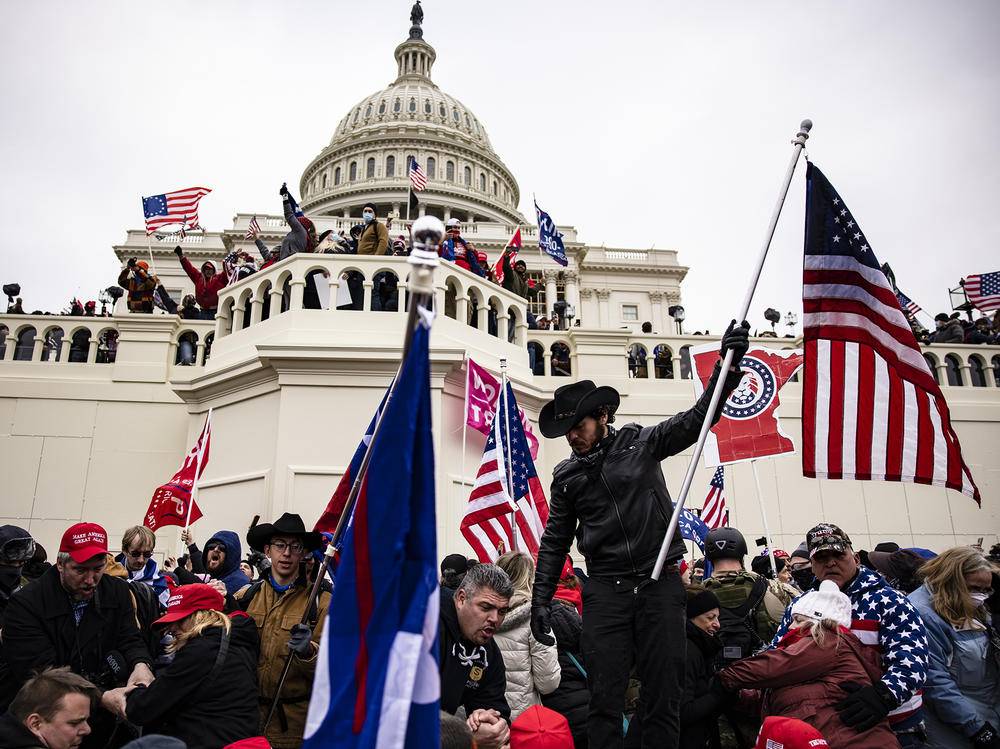Section Branding
Header Content
Attorneys give closing arguments in the Oath Keepers Jan. 6 seditious conspiracy case
Primary Content
Prosecutors delivered their closing argument Friday in the Jan. 6 seditious conspiracy trial against Oath Keeper founder Stewart Rhodes and four others, telling jurors that a "mountain of evidence" shows the defendants plotted to use force to stop the transfer of presidential power to Joe Biden.
Over roughly two hours, Assistant U.S. Attorney Kathryn Rakoczy walked the jury through some of the evidence — text messages, videos and witness testimony — presented over the past seven weeks and said it demonstrates a conspiracy to disrupt the peaceful transfer of power for the first time in American history.
"Our democracy is fragile. It cannot exist without respect for the rule of law," Rakoczy said. "And it will not survive if people who are dissatisfied with the result of an election can use force and violence to change the outcome. That is what these defendants did. They conspired to — and did — halt the transfer of power on Jan. 6."
"That is unacceptable," she said. "That is criminal."
Rhodes and co-defendants Kelly Meggs, Jessica Watkins, Kenneth Harrelson and Thomas Caldwell are charged with seditious conspiracy, obstruction of an official proceeding and other crimes in connection with the events of Jan. 6, 2021.
Their trial is the most consequential so far to come out of the investigation into the deadly attack on the U.S. Capitol.
Rakoczy opened her closing argument with Rhodes' own words, citing a message he sent on Nov. 5, 2021: "We are not getting through this without a civil war. Prepare your mind, body and spirit."
"Two days after the presidential election," Rakoczy told jurors, "Mr. Rhodes called for war with all of its horrors and violence to oppose the results of a presidential election. Think about that."
She said Americans had been divided and angry over election results before in U.S. history, but nevertheless for two centuries power had been peacefully transferred because people ultimately respected the rule of law.
But, she said, "not these defendants."
"A mountain of evidence has shown that these five defendants joined together and agreed to do whatever necessary, up to and including the use of force, to stop the lawful transfer of power to Joe Biden," she said.
The defendants amassed an "arsenal of deadly weapons" that they brought to the Washington, D.C., area for a quick reaction force to rush firearms downtown if necessary on Jan. 6, she told the jury.
Some of the defendants booked rooms at the same hotel in Virginia, where they stored their guns for the quick reaction force — coordination, she said, that "helps show that there was an agreement, a conspiracy."
Rhodes, she said, was the "orchestrator of this conspiracy and the architect" of the plan to block the certification, while the other defendants played various other leadership roles.
Throughout the trial, prosecutors repeatedly used the defendants' own words against them.
Rakoczy reminded the jury of inflammatory messages Rhodes sent in the weeks and days leading up to Jan. 6, and on the day itself, and urged the jury not to become "numb" to such rhetoric.
"Let's be straight: the defendants' words in this case were not the mere rantings and ravings of old men at a barber shop," she said. "They repeatedly called for the violent overthrow of the U.S. government. And they followed up with action."
RHODES' ATTORNEY: NO PLAN
In his closing, Rhodes' attorney James Lee Bright acknowledged that Rhodes and his codefendants engaged in a lot of "horribly heated rhetoric and bombast."
"I don't agree with a lot of it, but it's not indicative of a meeting of the minds," Bright said. "Venting is not a meeting of the minds. Expressing hatred and anger is not a meeting of the minds in this country."
"Is it inappropriate? Yeah. A lot of it. Is it something we wish wouldn't be done. Absolutely," he added. "But all of them talking about the same topic is not a meeting of the mind."
Bright told jurors that he'd made a point over the course of the trial of asking witnesses three questions: Was there a plan to storm the Capitol? Was there a plan to breach the rotunda? Was there a plan to stop or delay the certification of the election?
"We've had 50 witnesses in this case. Not one person has testified that there was a plan. Not one," he said.
He pushed back against the government's portrayal of the quick reaction force as an offensive force designed to assault the Capitol, and argued that the Oath Keepers were only in D.C. that day to provide security for speakers and Trump supporters.
In the end, Bright urged the jury to carefully consider all the evidence in the case, telling them that "lives are at stake."
"When you take the time to look at this through the alternative lens and not just what the government is giving you, there is a similarity of stories and they diverge," he said. "They diverge with the concept of whether there was a meeting of the minds."
Without a meeting of the minds and a conspiracy, he asked, what did Rhodes actually do?
"He stayed outside. He didn't go in. He didn't destroy anything in the Capitol. He didn't have a bullhorn saying 'Go, go, go.' He didn't push anybody," Bright said. "He filmed. He took pictures."
He closed by urging the jury to find Rhodes not guilty on all counts.
Attorneys for the remaining defendants still have to present their own closing arguments.
Copyright 2022 NPR. To see more, visit https://www.npr.org.

